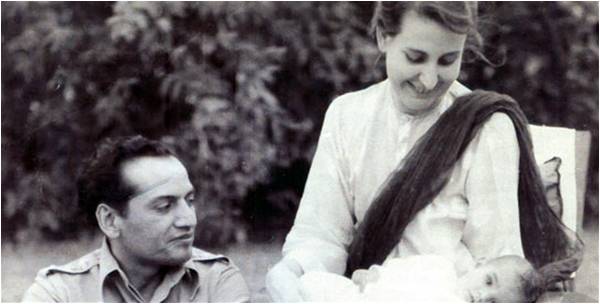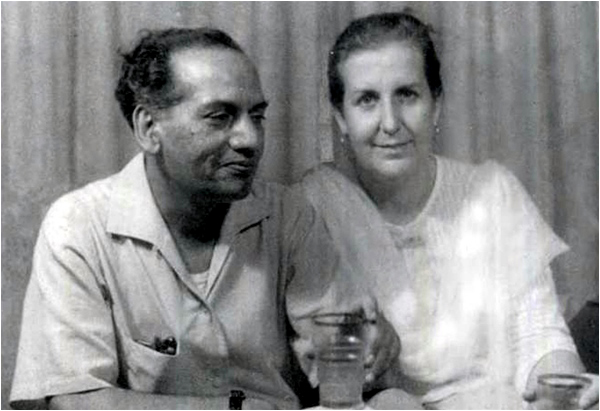
“Of fragrance and color, beauty and goodness
The metaphors all began and ended in you”
– Faiz
(Translation: Musharraf Ali Farooqi)
Alys Faiz was born Alys Catherine Ivy George in London in 1913 into a family of booksellers. She studied till Matriculation and received the prestigious Mathematics prize for the entire city of London in her Matriculation. It was no longer possible though, after her Matriculation, for Alys to study further due to her family’s financial condition and so she did a stenographer’s course and went to work. By this time, the “Freedom for India” movement had started and Alys became a supporter and member of the ‘India League’ and went to work as a secretary for VK Krishna Menon (1896-1974), Indian nationalist, diplomat and later India’s Defense Minister.
It was while working with the India League that Alys and her sister Chris became friends with students and expatriate Indians living in and around London, some of whom would later become the driving forces of the All-India Progressive Writers’ Association. Alys and Chris’s circle included Mohammad Din Taseer who Chris eventually married and who would become the first Indian to get a PhD in English Literature from Cambridge. He was also the co-editor of the famed literary magazine ‘Nairang-e Khayaal’ in Lahore before his untimely death from a heart attack at the age of 47.
[quote]Allama Iqbal acted as 'Qazi' for the marriage[/quote]
Taseer finished his studies and returned to India and once he found employment, in September, 1936, Christabel came to India as well. Allama Iqbal, Taseer’s teacher and mentor, who had advised him to choose a European wife, had spent three months carefully drafting the ideal marriage deed for the couple. Iqbal, though he was very ill, also acted as ‘Qazi’ for the marriage. Later, Faiz and Alys’ marriage contract would be written on the same lines and these clauses would later be incorporated into Pakistan’s Muslim Family Laws Ordinance.
By 1938, Christabel and Taseer had had their first child, a girl they named Salma, and it was to see her that Alys came to India. Dr. Taseer was the Principal of MAO College Amritsar where Faiz was a lecturer. They were polar opposites in their temperament and, years later, Alys would say that that’s why she liked him; he was so quiet. She wrote in her book ‘Over My Shoulder’: “And there was Faiz, a teacher in MAO college who came regularly (to Taseer’s house) reciting poetry when called upon and claiming my early attention. We became good friends, walking in the evening, driving in Taseer’s Victoria carriage to the gardens, to drink cool well water. We talked of all manner of things and I found he was not taciturn, but shy, with a becoming sense of humour. Our friendship grew into something special”. Alys had strong opinions about everything, would open up easily and would not mince her words while Faiz preferred to sit silently in his circle of friends and listen, rather than talk.
Faiz’s mother was initially opposed to the marriage. Their daughter Salima Hashmi remembers: “When Bebe-ji (Faiz’s mother) found out, she had a fit, in her own quiet way. She tried to show Abba lots of ‘suitable’ girls (to marry). Once she went to Gurdaspur and decided to say that she was seriously ill. Abba had to go to Gurdaspur where she pleaded with him that it was her life’s last wish to have him marry so and so. Abba just quietly said: ‘you’ll be fine, you’ll recover’ because he could be really obstinate too and so she recovered (*laughing*). It took them about 3 years to convince everyone, from about 1938 till 1941”.
In the latter half of 1939, Faiz applied for admission to Cambridge University and was accepted. He started preparing for his departure, booked his passage on an Italian ship and bought his train ticket to Bombay from where the ship was due to sail on September 11, 1939. On September 1 came the news that World War II had broken out.

Because of the war, Alys, of course, had to postpone her plan to return to England. Taseer and Christabel as well as her parents wanted her to stay in India for a while, as did Faiz. Being in love with Alys had given new life to Faiz’s poetry. They wrote to each other often and occasionally met. Alys would come to Lahore on Sundays and stay at Sufi Tabassum’s house. She had started learning Urdu. Faiz would sit with her and try to explain a poem he had recently written or, if he was feeling particularly enthusiastic, would attempt to explain the creative impulse behind the poem. Many years later, after Faiz’s death, in a conversation with the poet Amrita Pritam, Alys would say, ‘The truth is that I have never been able to appreciate the depth of Faiz’s poetry. Learning a new language is one thing, but to understand a whole culture, a whole civilization is something else’.
Till Death Do Us Part
At last, after a long wait, Faiz’s mother relented and Faiz informed Alys that if Taseer and Christabel agreed, they could have a simple marriage the same year. By mutual consent, October 28, 1941 was fixed as the wedding date.
[quote] "Waiting for the sun to set...I remember a heartsickness almost stopped the breath in my throat"[/quote]
Just because Faiz’s family had consented did not mean that all would be eventually well. Alys was well aware of the challenges ahead. She wrote years later in ‘Over My Shoulder’: ‘I remember an evening in Srinagar, a few days before my marriage. Waiting for the sun to set...I remember a heartsickness almost stopped the breath in my throat. Would this new country accept me? Could I live in this world of contrasts – poverty and riches? In the heat and dust of Punjab’s summer? A poor man’s wife? I could find no answer. Only the passing years would reveal it.’
Sheikh Abdullah, Kashmir’s illustrious leader acted as the ‘Qazi’ and performed the nikah rituals. The happy couple honeymooned for a couple of days in Srinagar and then headed back to Lahore where Faiz’s family were waiting to welcome them.
As planned, the family received them in Lahore and took them home. Alys later wrote: ‘I was seated on a stool, surrounded by nieces and nephews, cousins and their daughters, sisters in law, half sisters, all pushing, laughing, screaming, trying to peep at my face under my veil, gazing at those foreign blue eyes’.
In one ceremony, Faiz’s mother placed the Quran in her hands, blessed her and named her ‘Kulsoom’.
Faiz and Alys were about to begin their new life together and not in her wildest dreams could Alys have known what was to follow. She worked for the first Puppet Theatre in the Lahore Arts Council, the Children’s Aid society, the TB Association of Pakistan and was the moving force behind all of these organizations. She started the first women’s and children’s page in a Pakistani newspaper, a column in the Pakistan Times by the name of ‘Apa Jaan’.
Faiz greatly appreciated Alys’ devotion to him and their family and understood the sacrifices she had made for them. A lesser woman might have crumbled in the face of all that was to come in their lives.
Alys Faiz died in 2003. She and Faiz are buried next to each other in Model Town graveyard.
September 22, 2014 was Alys Faiz’ Centennial.
Ali Madeeh Hashmi is a Trustee of the Faiz Foundation Trust. He can be reached at ahashmi39@gmail.com or via his twitter @Ali_Madeeh

